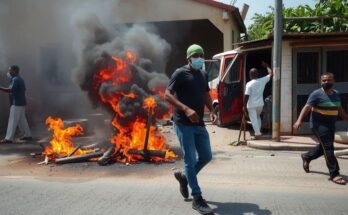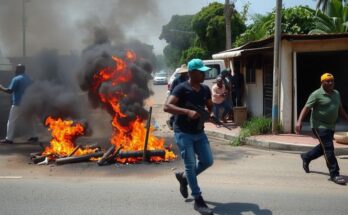The Dominican Republic announced a plan to deport up to 10,000 undocumented Haitians weekly, citing the need to manage excessive migrant populations amid Haiti’s ongoing instability and violence. President Luis Abinader criticized the international response to Haiti’s crisis, emphasizing national responsibility and ongoing efforts to enhance border security. The plan raises concerns about human rights and the treatment of Haitian migrants in the Dominican Republic, where historical tensions persist.
The Dominican Republic has initiated a significant measure to manage the rising numbers of undocumented Haitian migrants, announcing plans to deport up to 10,000 individuals per week. This decision follows the recent announcement from the Haitian government aimed at resolving the excessive migrant influx stemming from ongoing instability and violence within Haiti. Presidential spokesman Homero Figueroa emphasized that these deportations would commence immediately and adhere to stringent protocols ensuring the protection of human rights. The Dominican government justifies this initiative by pointing to the international community’s slow response in restoring stability in Haiti, which has been plagued by gang violence—culminating in over 3,600 fatalities this year alone. In light of this, President Luis Abinader has expressed frustration with the United Nations’ efforts, warning that responsibility lies with both the UN and individual nation-states to take action or risk the Dominican Republic taking matters into its own hands. Since President Abinader took office in 2020, he has effectively implemented a strict immigration policy, including the construction of a substantial border wall and a dramatic increase in deportations, having expelled around 250,000 undocumented Haitians throughout 2023. The new deportation plan may significantly increase this figure, equaling more than half of all Haitians estimated to be living in the Dominican Republic currently. Further efforts to monitor the border will include enhanced surveillance using drone and camera technology. This situation is exacerbated by Haiti’s ongoing economic and social collapse, which has prompted many to seek refuge in the Dominican Republic, a nation with contrasting economic conditions. Unfortunately, Haitian communities in the Dominican Republic report persistent discrimination and racism, complicating the already challenging environment for migrants. The ongoing humanitarian crisis within Haiti continues to drive migration patterns, aligning with a history of strained relations between the two nations. As each country grapples with its own challenges, the international community’s actions and responses will undoubtedly play a pivotal role in shaping future relations and treatment of Haitian migrants.
The current migrant crisis in the Dominican Republic is largely rooted in the dire conditions in Haiti, a country suffering from extreme instability, gang violence, and widespread poverty. Since the catastrophic earthquake in 2010, Haiti has struggled to regain stability, leading many of its citizens to seek better opportunities across the border. The Dominican Republic, sharing the island of Hispaniola with Haiti, has long been a destination for Haitian migrants. However, the rapid influx of Haitian migrants has led to increased tension and a strict immigration policy in the Dominican Republic, highlighting the complexities of bilateral relations between the two nations and the broader implications of migration in the region.
In conclusion, the Dominican Republic’s new policy to deport 10,000 undocumented Haitians each week reflects the country’s response to escalating migration pressures and challenges stemming from Haiti’s deteriorating conditions. While aimed at managing excessive migrant populations, this initiative raises concerns regarding human rights and the treatment of vulnerable migrants. As both nations navigate this complex issue, the role of international policymakers will be crucial in fostering stability and addressing the root causes of migration from Haiti.
Original Source: www.france24.com




